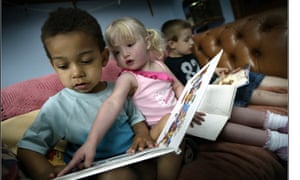
The vocabulary of children from the poorest backgrounds lags more than a year behind that of their classmates from richer homes by the time they start school, a major new study showed today.
The Sutton Trust, the charity which sponsored the research, said the divide was a “tragic indictment of modern society”, showing how educational inequality starts young and leaves children from the most disadvantaged homes struggling to keep up throughout their school years.
The poorest children face multiple challenges, being less likely to be born to well-educated parents, have a regular bedtime or live with both their biological father and mother, the study found. However, it also concluded that “good parenting can triumph”, with families able to limit the effects of poverty by, for example, reading to their children daily.
Researchers from Bristol and Columbia universities analysed the performance of a representative sample of 12,644 British five-year-olds in a “naming vocabulary test” during 2006 and 2007. They then produced a “developmental age” score for each child, comparing their test results to the average achieved in the study.
The gap between rich and poor children, and even between middle-income and poor, was striking. Those from the poorest 20% of homes, where household annual incomes averaged £10,300 before tax, had an average developmental age of 53.6 months. The comparable figure for those from middle-income families, on around £30,000 a year, was 64.6 months, or 11 months ahead. Children from families in the richest 20% , on around £80,000, reached a development age of 69.8, a further five months ahead. Income itself accounted for only around a third of the differences in test scores, with some 48% caused by differences in parenting between the income groups.
Reading to a child every day was found to improve performance in the test – among children in the same income group, it raised scores by around two months – while regular library visits improved performance by 2.5 months. But only 45% of children from the poorest fifth of families were read to daily at the age of three, the study found, compared to 78% among the richest fifth.
More than a third of children from the poorest fifth of families were born to parents without a single GCSE A-C grade, while four in five of the richest families had at least one parent educated to degree level.
Some two thirds of children in the poorest income group did not live with both biological parents, compared to only one in 10 in middle-income families. Sir Peter Lampl, chairman of the Sutton Trust, said: “These findings are at once both shocking and encouraging, revealing the stark educational disadvantage experienced by children from poorer homes before they have even stepped into the school classroom, but also the potential for good parenting to overcome some of the negative impacts that poverty can have on children’s early development.”
The trust is now urging the government to abandon its plans to increase the amount of free nursery education it offers to all three-and-four-year-olds from 12.5 hours to 15 hours a week this year. Instead, it should provide 25 hours a week of education to the 15% most disadvantaged families. The trust also wants improvements in parenting classes for poorer families.
The children’s minister, Delyth Morgan, said: “A huge amount has happened in recent years and it’s a shame the Sutton Trust fails to reflect much of this. Many of its key recommendations have already been addressed. While there is much more to do, the gap between rich and poor in early years is closing, with the lowest-achieving children not only keeping pace but improving faster than the rest.”
[“source-theguardian”]




